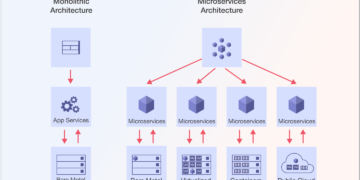Introduction to AI and Data Analytics
Welcome to the era where data reigns supreme and artificial intelligence is the key to unlocking its full potential. In today’s fast-paced business world, harnessing the power of AI in data analytics is no longer just a competitive advantage – it’s a necessity. Let’s delve into how businesses can leverage AI to gain deeper insights, make smarter decisions, and stay ahead of the curve in this ever-evolving landscape.
The Advantages of Using AI in Data Analytics
AI in data analytics offers businesses many advantages that can revolutionize decision-making processes and drive growth. One key benefit is the ability of AI algorithms to process vast amounts of data at lightning speed, providing real-time insights for faster and more informed decisions. By automating repetitive tasks like data cleansing and analysis, AI frees up valuable time for employees to focus on strategic initiatives.
Moreover, AI-powered analytics can uncover hidden patterns and correlations within data sets that human analysts may overlook. This deeper level of analysis enables businesses to identify trends, predict outcomes, and optimize operations with greater accuracy. Additionally, AI enhances data security by detecting anomalies and potential breaches in real time, helping organizations protect sensitive information from cyber threats.
Furthermore, the scalability of AI allows businesses to handle growing volumes of data without compromising performance or accuracy. As companies embrace digital transformation, leveraging AI in data analytics will be essential for staying competitive in today’s rapidly evolving marketplace.
Real-Life Examples of Successful Implementation
Imagine a retail giant utilizing AI in data analytics to predict customer preferences and optimize inventory management. The system can accurately forecast demand by analyzing past purchasing patterns, reducing overstocking and minimizing losses.
AI is revolutionizing patient care in the healthcare sector by analyzing vast medical data to identify potential health risks early on. This proactive approach enables healthcare providers to offer personalized treatment plans for better outcomes.
Tech companies are leveraging AI in data analytics for fraud detection and cybersecurity. Advanced algorithms can detect real-time anomalies, preventing unauthorized access and safeguarding sensitive information from cyber threats.
Furthermore, financial institutions harness AI’s power in risk management by identifying market trends and making informed investment decisions. This strategic advantage helps them stay ahead of competitors and maximize client returns.
These real-life examples showcase how businesses across various industries successfully implement AI in their data analytics strategies to drive growth, enhance efficiency, and gain a competitive edge in today’s digital landscape.
How Businesses Can Begin Using AI in Their Data Analytics Strategy
Businesses looking to integrate AI into their data analytics strategy can start by identifying key areas where AI can add value. This could involve automating repetitive tasks, improving decision-making processes, or uncovering valuable insights from large datasets.
Next, investing in the right tools and technologies that align with the organization’s goals is essential. Whether it’s machine learning algorithms, natural language processing software, or predictive analytics platforms, choosing the right solutions is crucial for success.
Training employees on how to leverage these AI tools effectively is also essential. Offering workshops, online courses, or hiring data scientists can help build a skilled workforce capable of harnessing the power of AI for better business outcomes.
Collaborating with experts in the field and staying updated on the latest advancements in AI technology will also be beneficial for businesses venturing into this domain. By continuously learning and adapting, companies can remain competitive and drive innovation through AI-driven data analytics strategies.
The Future of AI in Data Analytics: Predictions and Possibilities
As we look ahead to the future of AI in data analytics, the possibilities are limitless. With advancements in machine learning and deep learning algorithms, businesses can expect even more accurate predictions and insights from their data.
One exciting prediction is the increased automation of data analysis processes through AI. This will save time and improve efficiency by allowing organizations to focus on strategic decision-making rather than manual data crunching.
Additionally, AI is expected to enhance personalization capabilities for businesses across various industries. By leveraging AI-driven analytics, companies can tailor their products and services to meet individual customer needs at scale.
Moreover, as AI evolves, we may see a rise in predictive analytics models that can accurately anticipate market trends and consumer behavior. This proactive approach could give businesses a competitive edge in fast-paced markets.
The future of AI in data analytics holds immense promise for driving innovation and unlocking new opportunities for business growth.
Potential Challenges and Ethical Considerations Surrounding AI in Data Analytics
As businesses increasingly rely on AI for data analytics, potential challenges and ethical considerations need to be addressed. One of the critical concerns is the risk of biased decision-making due to algorithms reflecting existing societal prejudices. This can lead to discriminatory outcomes and perpetuate inequality in various aspects.
Another challenge is the issue of transparency and accountability. With complex AI systems making decisions, it cannot be easy to understand how these conclusions were reached. Lack of transparency may raise doubts about the reliability and fairness of AI-driven analytics.
Moreover, there are concerns about data privacy and security when sensitive information is used for analysis. Unauthorized access or misuse of data can result in breaches that severely affect individuals and organizations.
To navigate these challenges effectively, businesses must prioritize ethical guidelines, promote diversity in their teams developing AI solutions, and implement robust measures to ensure data protection throughout the analytic process. By addressing these issues proactively, companies can harness the power of AI in data analytics responsibly and with integrity.
Conclusion: Embracing the Power of AI for Better Business Insights
Embracing the Power of AI for Better Business Insights
As businesses navigate an increasingly data-driven world, incorporating AI into their data analytics strategy is no longer just a trend but a necessity. AI in data analytics offers unparalleled advantages, from enhancing decision-making processes to uncovering valuable insights that can drive growth and innovation.
By leveraging AI algorithms and machine learning capabilities, businesses can gain a competitive edge by unlocking patterns, trends, and correlations within vast amounts of data that would be impossible to analyze manually. Real-time analysis enables companies to adapt swiftly to changing market conditions and customer preferences, ultimately improving operational efficiency and profitability.
Looking ahead, the future of AI in data analytics holds exciting possibilities. Advancements in natural language processing (NLP), image recognition, and predictive analytics are poised to revolutionize how businesses extract value from their data. Organizations can expect even more sophisticated tools for forecasting trends, identifying risks, and personalizing customer experiences as AI technologies evolve.
Nevertheless, along with these opportunities come challenges and ethical considerations that must be addressed. Businesses need to ensure transparency in collecting and utilizing data while upholding privacy regulations and safeguarding against biases embedded in AI systems. By fostering a culture of responsible AI usage, companies can build trust with customers and stakeholders while mitigating potential risks associated with algorithmic decision-making.
In conclusion
Embracing the power of AI in data analytics is not just about embracing cutting-edge technology; it’s about empowering businesses to make informed decisions based on accurate insights derived from complex datasets. By harnessing the potential of AI-driven analytics solutions responsibly and ethically, organizations can pave the way for sustainable growth and long-term success in today’s digital landscape.



































